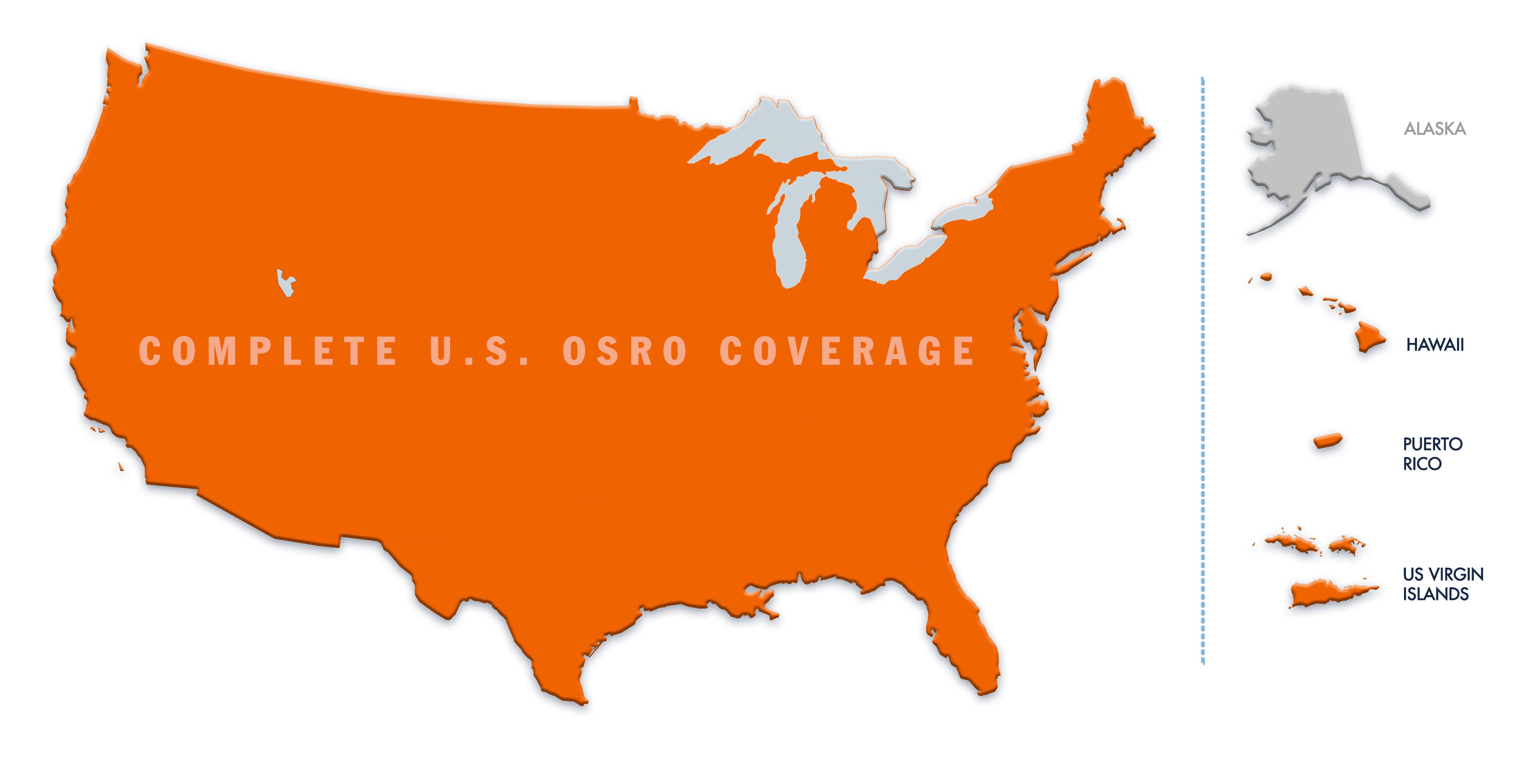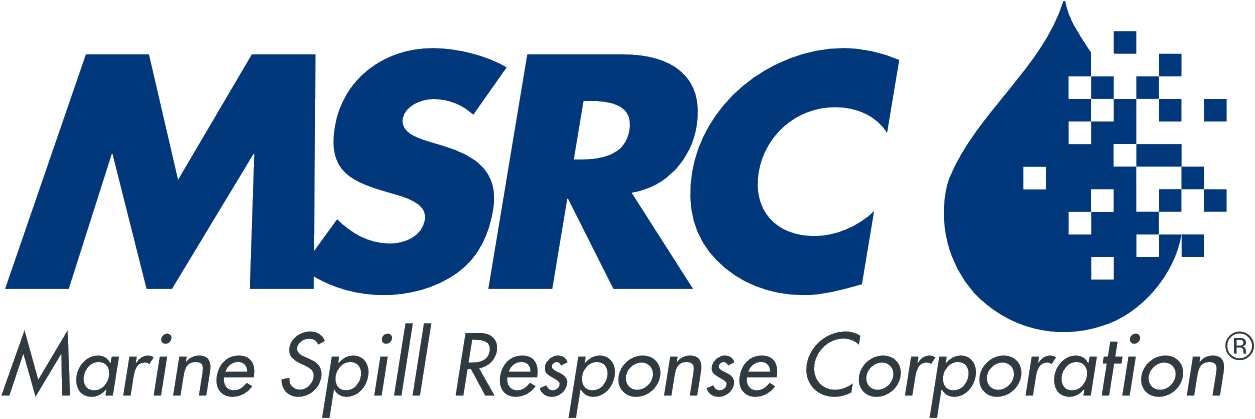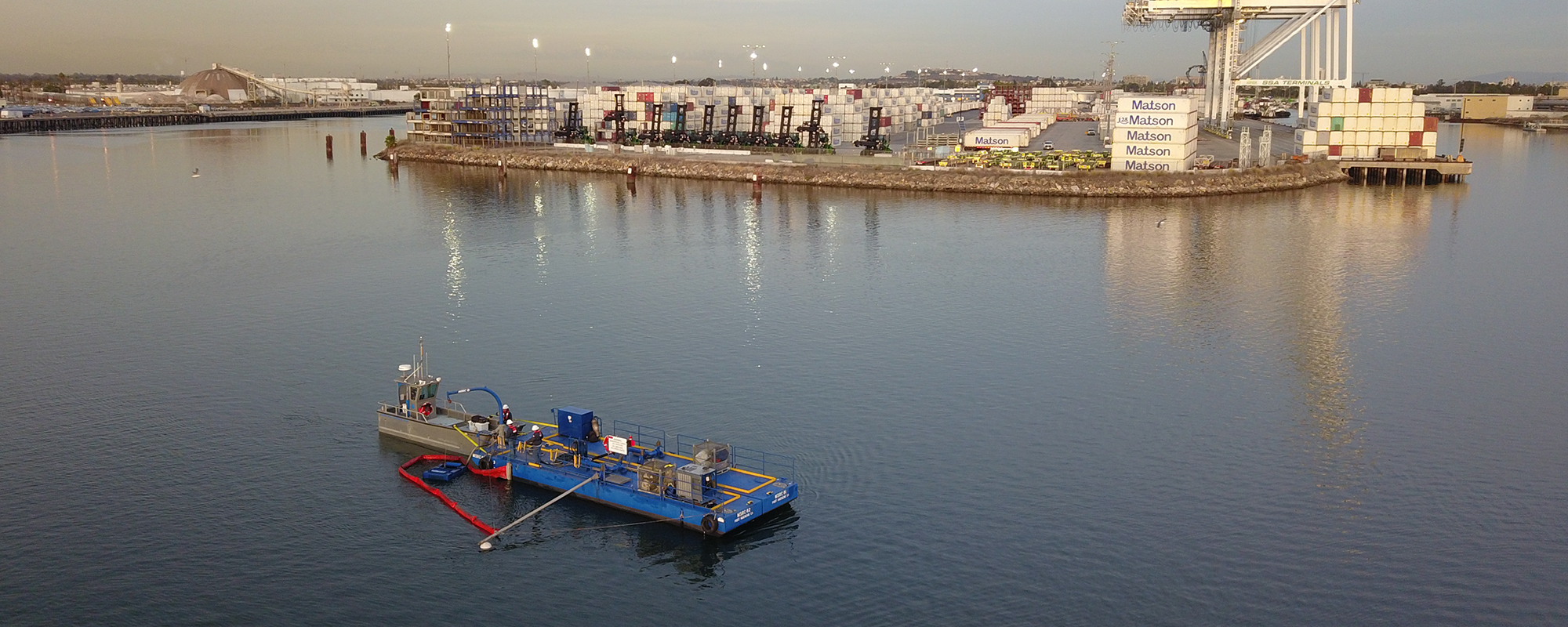Federal and State regulations require that all oil-handling facilities and vessels have a response plan in place and the preparedness, readiness and capabilities to respond effectively to an oil spill incident. Instead of developing their own internal capabilities, many companies opt for contracting with an Oil Spill Removal Organization (OSRO) to meet these requirements.

The MSRC operational area includes all coastal Captain of the Port Zones (excluding Alaska). Currently, MSRC meets the following planning requirements as demonstrated through the Coast Guard's Classification Program:
- Maximum Most Probable Discharge (MMPD) in all coastal COTP zones
- Worst Case Discharge (WCD 1, 2 & 3) in all coastal COTP zones
- Facilities and Vessels (as appropriate)
- Dispersants in all pre-approved COTP zones
The voluntary Oil Spill Removal Organization (OSRO) classification system (USCG RRI) was developed by the U.S. Coast Guard (USCG) to aid vessel and facility response plan holders in preparing reliable spill response plans. By using this classification system, plan holders do not have to present detailed lists of response resources. Instead, they may cite an OSRO that is classified to meet their spill discharge scenarios. Classifications are based on the OSRO's inventory of minimum equipment applicable to a geographic area for various marine operating environments and various spill discharge scenarios (MMPD, WCD 1-3). View MSRC's OSRO Classification see OSRO #22.
When choosing an OSRO, it is important to understand that the USCG OSRO classification system is not a list of “approved” OSROs. The USCG classifies OSROs based on the existence of minimum required equipment inventory located within the COTP zone applicable to each discharge scenario and marine operating environment for the classification rating. This means that a classified OSRO can earn its OSRO classification by maintaining the minimum required equipment, but still fail to mount an effective response for a discharge scenario. This unfortunately happens all too regularly.
Since plan holders are ultimately liable for their OSRO’s performance in a spill response, not the OSRO itself, it is vital when choosing an OSRO to verify that the OSRO can respond to all of your spill discharge scenarios, in all the locations where you operate.
The OSRO Evaluation Checklist offers guidance on how to evaluate the capability and reliability of a spill response organization:
1) Verify Regional Compliance
- Reference the USCG RRI and State regulations
2) Validate the OSRO’s Capability
- Request updated Equipment Lists / Responder Resources
- Conduct site visits, assess equipment condition
- Evaluate reliance on contracted resources vs. dedicated resources
3) Know the OSRO’s Contracting Capability
- Vetting, Qualification Process and Training Programs
- Command & Control of contractors during a response
4) Understand the OSRO’s Cost Profile
- Retainer Fees, Voyage / Transit Fees for certain zones, AMPD Fees
- OSRO Response Rates, Contractor Rates & Contractor Mark-up
- Can response costs be tracked, audited, verified?
- Cost of drill and exercise support?
5) Learn the OSRO’s Performance History
- Federal and State Readiness inspection / drill performance
- Response performance track record (ask your customers & peers)
- Does your OSRO practice? Field Deployment exercises are critical to readiness.
MSRC may be cited in vessel and facility response plans as a resource to help meet U.S. Coast Guard, EPA and BSEE planning requirements and in the following situations:
- Aerial Observation
- Average Most Probable Discharge (AMPD)
- Maximum Most Probable Discharge (MMPD)
- Worst Case Discharge (WCD) W1, W2, W3
- Shallow water cleanup
- Shoreline protection and cleanup
- Dispersants
MSRC may be cited in response plans to help satisfy the customer's OPA-90 planning requirements in our primary operational areas, including:
- U.S. East, Gulf, and West Coasts
- U.S. Interior
- U.S. Caribbean (Puerto Rico, US Virgin Islands)
- Hawaiian Islands
In accordance with OPA-90 and the Oil Spill Removal Organization (OSRO) Classification guidelines, the plan holder accepts all responsibility for its citation of MSRC, and citation of MSRC does not relieve the plan holder of the responsibility to ensure its OSRO is capable of responding to all of its spill scenarios.
Additionally, those customers who operate facilities or vessels in Alaska as well as the U.S. Territories of Guam and America Samoa can access MSRC’s capabilities for secondary support resources in the event of a spill; however, they must contract with a local Alternative Planning Criteria (APC) holder for OSRO citation. MSRC is not an APC holder for these areas.
Several states have enacted their own laws and implemented regulations requiring petroleum transportation companies and others that store and/or transport petroleum to file vessel and facility response plans. MSRC can help meet these planning requirements on behalf of customers within its Operational Area (which is essentially defined as the U.S. coastal environment).
For the following states with planning requirements, MSRC is able to provide the following assistance:
California: MSRC is Certified by the California Department of Fish and Game, Office of Spill Prevention and Response (OSPR) as an Oil Spill Response Organization (OSRO). Within the State of California, MSRC customers may cite MSRC in their vessel and facility response plans within the MSRC Operational Area. For citation of MSRC inland of the California coast, please refer to MSRC’s OSRO rating issued by OSPR or contact MSRC directly to verify plan citation capability.
Washington: MSRC is an approved Primary Response Contractor (PRC) by the Washington State Department of Ecology. MSRC customers may cite MSRC resources, including aerial surveillance and remote sensing, vessel of opportunity (VOO), in situ burn, dispersants, mobile wildlife care capability and all other regulatory requirements to help meet Washington State Contingency Planning requirements.
MSRC partners with Washington State Maritime Cooperative (WSMC) to meet Washington State Contingency Plan requirements for tank and non-tank vessels entering Puget Sound and Grays Harbor. Please visit the WSMC website for more information on how to sign up with WSMC.
Alaska: MSRC cannot be cited as a Primary Response Contractor to meet the State of Alaska planning requirements. However, customers may still cite MSRC as a supplemental resource in their plans and access MSRC equipment and personnel for supporting spill response.
MSRC’s Interior Region capability has evolved over the past several years into a credible response solution offering complete U.S. Inland OSRO coverage. MSRC has USCG OSRO classification for all US COTP zones in the interior U.S. The Interior Region capability is comprised of a combination of MSRC’s coastal resources that can be cascaded to an incident site and an expanded STARs network of local environmental services contractors. The expanded STARs contractors in the interior receive regular specialized training from MSRC responders for the operating conditions and tactics required for interior scenarios in that area.
MSRC identifies and vets interior STARs contractors based on their capabilities, training performance, and geographic location to meet required response timelines. Please note that MSRC is not an appropriate solution to 1-hour OSRO requirements in the Interior U.S. If you are a facility with a 1-hour response requirement, you will need to contract directly with a local provider or invest in internal equipment and dedicated personnel onsite.
The Coast Guard does not classify OSROs for Average Most Probable Discharge (AMPD), though AMPD remains an important aspect of most response plans with tight 1– to 2- hour deployment timelines and is often tested in Government Initiated Unannounced Exercises. MSRC can assist plan holders in arranging reliable AMPD capability, but this service is not included as part of MSRC’s national contract. AMPD capability can be achieved through MSRC resources, STARs contractor resources or internal resources trained to deploy response equipment located on site, or a combination of any of these.

